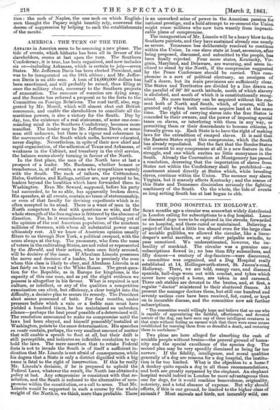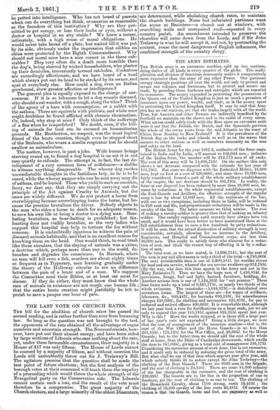THE DOG- HOSPITAL IN HOLLOWAY.
SOME montlis ago a circular was somewhat widely distributed in London calling for subscriptions to a dog hospital. Lame or diseased dogs were to be captured in the streets, forwarded to an hospital, and there cured or maintained. Believing a project of the kind a little too absurd even for the large class of amiable gullibles, we allowed the circular, like a linen- draper's awful sacrifice, or any other palpable swindle, to pass unnoticed. We underestimated, however, the im- becility of mankind. The circular was a genuine one ; subscriptions flowed in ; no less than fifty subscribers, and fifty donors—a century of dog-fanciers—were discovered, a committee was organized, and a Dog Hospital really established, at 14, Hollingsworth-street, St. James's-road, Holloway. There, we are told, mangy curs, and diseased spaniels, bull-dogs worn out with combat, and tykes which never have enjoyed a home, are taken in and caressed. Three cab stables are devoted to the brutes, and, at first, a regular "doctor" ministered to their shattered frames. At present the manager doctors them, but still one hundred and seventy useless curs have been received, fed, cured, or kept on in incurable disease, and the committee now ask further subscriptions.
"The committee would willingly hope and believe that no one who is capable of appreciating the faithful, affectionate, and devoted nature of the dog, can have seen any of these intelligent creatures in that state without feeling an earnest wish that there were some means established for rescuing them from so dreadful a death, and restoring them to usefulness."
Two pleas are here alleged for absorbing the cash of amiable people without brains—the general ground of huma- nity and the special excellence of the species dog. The second plea may be very speedily dismissed as being far too narrow. If the fidelity, intelligence, and moral qualities generally of a dog are reasons for a dog hospital, the institu- tion is far too limited. What is the objection to a horse ? A donkey quite equals a dog in all these recommendations, and both are greatly surpassed by the elephant. An elephant hospital would indeed in London be more advantageous than one for dogs, for it would combine benevolence, originality, notoriety, and a total absence of expense. But why should efforts, if this is our ground, be limited to the higher class of animals ? Most animals and birds, not incurably mild, can be petted into intelligence. Who has not heard of parrots which can do everything but think, or canaries as reasonable as the founders of this institution ? Why are they per- mitted to get mangy, or lose their limbs or eyes, without a doctor or hospital in an airy stable ? We knew a mouse, intimately, with a high sense of moral obligations. He would never take bread off a plate, but waited till it was put by its side, obviously under the impression that edibles on china were protected by the Eighth Commandment. Why should not moral mice have a nice corner in the three cab- stables ? They very often die a death more horrible than the dog's, being starved by wicked householders, who plaster up their domiciles, irreverently termed rat-holes. Cockatoos are exceedingly affectionate, and we have heard of a toad which always put out its head to be stroked by its owner, and spat at everybody else. How could a dog, even an Italian greyhound, show greater affection or intelligence ? The general plea is equally exposed to the charge of nar- rowness. If it is so inhuman to let a dog remain diseased, why should a cat wander, with a cough, along the tiles? Think of the agony of a hare with consumption, or a rabbit with the asthma. There are squirrels with phthisis, and white mice might doubtless be found afflicted with chronic rheumatism. Or, indeed, why stop at mice? Only think of the sufferings of a flea when he is squelched ! We doubt, even, if the kill- ing of animals for food can be excused on humanitarian grounds. Mr. Brotherton, we suspect, was the most logical friend of the brute creation, though even he stopped short of the Brahmin, who wears a muslin respirator lest he should swallow an animalculum.
The matter, however, is past a joke. With human beings starving round us, to found a dog hospital is an act it is not easy quietly to ridicule. The attempt is, in fact, the last de- velopment of a very common form of selfishness—a dislike to witness anything disagreeable. The wheezy dog excites i uncomfortable thoughts n the fastidious lady, so he is to be cured, while the wheezy pauper who can be sent away may die of asthma, and be buried. Those who yield to such an emotion, fancy, we dare say, that they are simply carrying out the principle of the Act against Cruelty to Animals, but the cases are widely different. We do not protect a horse from overwhipping because overwhipping hurts the horse, but be- cause the practice brutalizes the driver. Nobody objects to the man who rides a horse to death for an adequate reason, to save his own life or bring a doctor to a dying man. Bear- bating brutalizes, so bear-baiting is prohibited ; but fox- hunting does not visibly brutalize, so the very ladies who support this hospital may help to torture the fox without remorse. It is undoubtedly injurious to witness the pain of diseased animals habitually, and that is an excellent reason for knocking them on the head. One would think, to read trash like these circulars, that the slaying of animals was a crime, a doctrine which, perhaps more than any in the world, de- bauches and degrades the conscience. In Burmah, where no man will kill even a fish, murders are about eighty times as frequent as in Tipperary, men learning gradually 'under the theory of the Holloway circular to see no difference between the pain of a brute and of a man. We suppose the Committee read their Bibles, or at least eat meat for dinner. If they do either, they must know that the whole race of animals in existence are not worth one human life ; that the entire brute creation might justifiably be left to perish to save a pauper one hour of pain.































 Previous page
Previous page